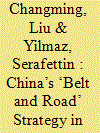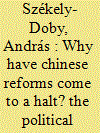|
|
|
Sort Order |
|
|
|
Items / Page
|
|
|
|
|
|
|
| Srl | Item |
| 1 |
ID:
158089


|
|
|
|
|
| Summary/Abstract |
The focus of this article is two-pronged. First, it highlights China’s ‘One Belt, One Road’ (OBOR) initiative as a Eurasia-centred project that, distinct from the twentieth-century Eurasianism, aims to introduce a new comprehensive integrationist agenda to the Eurasian strategic landscape. Second, it compares the US-led Euro-Atlanticism and the emerging Eurasianism, holding that while the former has historically stressed security over development (development is seen as contingent on the establishment of a hard security regime), the latter prioritises development over security (security is viewed as contingent on the establishment of an inclusive economic regime). Thus, this research argues that, if implemented successfully, OBOR could challenge Euro-Atlanticism as the long-held normative paradigm of interstate relations by offering a systemic alternative.
|
|
|
|
|
|
|
|
|
|
|
|
|
|
|
|
| 2 |
ID:
158088


|
|
|
|
|
| Summary/Abstract |
In the period 1946–1948, 13,721 Polish miners were repatriated by the state from France to Poland. The repatriation was vital to the development of coal mining. This repatriation was distinct because it did not involve returning to Poland people who had been displaced during the war. These Poles had emigrated to France during the interwar period. After a successful start, when over 5,000 men and their families came to Poland in 1946, the project came to a halt. Poland was not a welcoming environment for these men and France wanted to retain them.
|
|
|
|
|
|
|
|
|
|
|
|
|
|
|
|
| 3 |
ID:
158086


|
|
|
|
|
| Summary/Abstract |
We explore the evolution of the Kremlin’s election control strategy in response to the reintroduction of gubernatorial elections in 2012. Our analysis focuses on the evolution of four tools used to engineer electoral competition: auxiliary institutions, subnational punishment regimes, ballot construction, and turnout manipulation. We argue that election managers deploy these mechanisms to maximise victories for state-sponsored candidates while minimising the possibility for post-election protest. The analysis demonstrates that electoral manipulation presents conflicting incentives for the Kremlin and its regional officials. It also shows the critical role that Russia’s systemic opposition plays in the electoral management system and regime stability.
|
|
|
|
|
|
|
|
|
|
|
|
|
|
|
|
| 4 |
ID:
158085


|
|
|
|
|
| Summary/Abstract |
This study analyses the influence of the party reforms of 2012 and the ‘counter-reforms’ of 2013–2014 on the Russian party system, and the structure of political and electoral cleavages in Russian regions. The emergence of new political parties in 2012–2013 led to a temporary increase in electoral competition, an augmentation of the political space, and a rise in the number of electoral cleavages, but these developments did not weaken the domination of United Russia. The trend towards an ever greater tightening up of entry requirements for contestation in the elections led to a lowering of the number of political and, consequently, electoral cleavages, in addition to a reconfiguration of the political space. The study shows that there was an unbalancing of the political cleavage structure in 2012–2015: the socioeconomic political cleavage, whose primary place is a key determinant of equilibrium, ceded the top position to the authoritarian–democratic cleavage in 2012–2013, and to the ‘Ukrainian’ (systemic) cleavage in 2014–2015.
|
|
|
|
|
|
|
|
|
|
|
|
|
|
|
|
| 5 |
ID:
158087


|
|
|
|
|
| Summary/Abstract |
Focusing on Smolensk Oblast’, one of the fiercest battlegrounds of both World War II and the Napoleonic War of 1812, this study analyses small-town responses to the Russian government’s ‘City of Military Glory’ war commemoration project implemented in 2006. By examining the ways in which local authorities and local residents redefined identities in the former wartime front region by reinventing local war symbols and reinterpreting local war memories, the article focuses on the central government’s success at mobilising local patriotism from below and the success of local authorities in consolidating local identity using war memories.
|
|
|
|
|
|
|
|
|
|
|
|
|
|
|
|
| 6 |
ID:
158090


|
|
|
|
|
| Summary/Abstract |
This study approaches the Chinese reform process from a political-economic point of view, focusing primarily on institutional changes. Besides revealing the main factors behind the different phases of the reforms, it argues that in the framework of the current authoritarian regime, vested interests work against the continuation of the reforms, making it impossible to fully establish the institutional framework of a market economy. Current rents and privileges also deter the elite from implementing serious political reforms, leading to a trap that prevents the completion of the transition process.
|
|
|
|
|
|
|
|
|
|
|
|
|
|
|
|
|
|
|
|
|